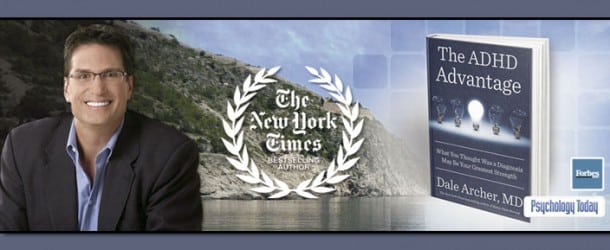An Interview With Dr. Dale Archer About His New Book
By Patricia Broussard
There was a time when a diagnosis of ADHD both alarmed and frightened parents. Just the name, Attention Deficit/Hyperactivity Disorder was enough to scare anyone.
That was then. This is now.
Local psychiatrist Dale Archer, M.D., has been helping numerous patients in all areas of psychiatry since he began his private practice more than 25 years ago.
When Archer was growing up, there was no such diagnosis as Attention Deficit/Hyperactivity Disorder. Kids were kids, and some had more energy than others.
Archer’s formative years were anything but normal. He was hyperactive and, as he says, bouncing off the ceiling. In school, he easily became bored and quickly discovered that if he sat in the back of class and slept, he would avoid getting into trouble.
He admits there were times he was difficult to handle. Looking back, he realizes how fortunate he was to have been in school during the 1960s, before the ADHD diagnosis came about. Otherwise, he would most likely have been put on medication, and might not have become as successful as he is today.
Archer’s father, Dr. Dale Archer Sr., was an ophthalmologist with, and the founder of, The Eye Clinic. When Archer entered Tulane University, his family hoped he would continue the family tradition and go into medicine. Though he started out in pre-med, he found he truly enjoyed philosophy. He completed his honors thesis in philosophy. But, of course, there was not a high demand for philosophers.
Dismayed, Archer took a year off to decide what to do next. He kicked back, traveling to Jamaica, Mexico and piddling around the Caribbean. On the suggestion (perhaps demand?) of his father, he returned to Louisiana and took the MCAT, the entrance exam required for medical school.
Scoring high marks, Archer was accepted into the Tulane University School of Medicine. Two weeks later, his life changed from R&R to intense studying, and stayed that way until he earned his M.D.
After medical school, Archer spent a year in an internal medicine residency, but he didn’t enjoy it at all. He discovered, however, he had a genuine appreciation for psychiatry — so much so that he changed and completed a residency in that field.
He returned to Lake Charles, and in July of 1987, fresh out of his residency, Archer was named the Medical Director of Charter Hospital.
He envisioned opening a full-service mental health psychiatric clinic to meet all the needs of people from all walks of life. On Feb. 1, 1988, his dream became a reality when he founded the Institute of Neuropsychiatry.
Archer is proud to say that after 27 years, the institute is still true to its original mandate: to help anyone with any mental illness, from children’s to geriatric; from personal to family. The institute truly is a full-service mental health clinic.
Archer has discovered much during his 27 years of practicing medicine — so much so that he wants to share his discoveries with the masses in the form of books. Archer’s first book, Better Than Normal: How What Makes You Different Can Make You Exceptional, concentrated on eight psychiatric conditions.
This redefining book brought welcomed changes in how we look at personality versus mental illness. It was an overnight success, immediately making its way up to No. 5 on the New York Times Best Seller List.
Archer wanted to emphasize the problem of overdiagnosis and empower those with a diagnosis. So he put each trait on a continuum ranging from 1-10+, with 1 being mild and 10 severe. Those with a 9, 10 or 10+, he hypothesized, probably needed treatment and medication.
The problem he discovered was that patients were being diagnosed and medicated when their range was between 5 and 8. In this range, he found some positive assets for each trait. These assets, which could be used to produce a successful life, were being medicated away.
As he wrote the ADHD chapter of Better than Normal, his research took him deeper and deeper into the ADHD traits, until it suddenly dawned on him — “Oh, my God! I’m ADHD!”
Although he had treated innumerable ADHD patients and was aware his own son was ADHD, he never thought of himself as being ADHD. With this new awareness, he was able to understand and appreciate his childhood in a completely different light, and things made more sense than ever before.
It dawned on Archer during his extensive and intense research that he would need to dedicate a book just to ADHD, perhaps the most often overdiagnosed trait of all.
To the parents of the 11 percent of school-aged children and 19 percent of high school boys diagnosed with ADHD, Archer gives this advice: (1) ADHD occurs along a continuum, don’t be dismayed. Much depends on the severity of the condition. Never forget there’s a good chance of overdiagnosis; and (2) There are many positives in ADHD.
Instead of focusing on the Double Ds — Deficit and Disorder — ADHD is not as horrible as it may sound. Hyperactivity, trouble paying attention, a wandering mind, being easily bored, procrastination, difficulty in finishing tasks all go into the ADHD diagnosis.
But, says Archer, “I like to say ‘trait’ as opposed to ‘diagnosis‚’ because diagnosis sounds so negative.”
Some of the positives of the ADHD trait, says Archer, are resiliency, the ability to multitask, high energy, creativity, a gift for nonlinear thinking, the ability to “hyper-focus” on what you love, athletic aptitude, a cool head in a crisis and others. He discusses each of those strengths in the book, and backs up his position with dozens of interviews with successful “ADHDers.”
It is Archer’s passion to make sure parents are informed, because with knowledge comes power and the ability to raise a child to reach his or her potential. “It’s our job as educators and psychiatrists to tell the parent and public not only the cons, but also the pros of having ADHD.” Because of this responsibility, as well as the number of children being diagnosed with ADHD, Archer is filling the need to give parents the whole picture of ADHD — not just a partial snapshot.
“The question of whether to medicate or not to medicate dominates the entire literature when it comes to the subject of ADHD,” says Archer. “It should be what’s good about ADHD versus what’s not so good, and how can we build a structure so the positives are emphasized and negatives are minimized.”
Archer’s passion on this subject is evident when he says, “These positives are pronounced in the mild to moderate cases. But even in the extreme cases of ADHD, there are still positives to be expanded upon. It’s never all negative; never a doomed diagnosis. Do not be discouraged by the Double Ds.”
Archer appears on national news-based shows to give psychological insights into various current events. His columns are a regular feature on the Psychology Today and Forbes websites.
His great passion is to accurately diagnose an individual and, whenever possible, not to medicate, but to illustrate how to make seemingly treatable traits work to the patient’s advantage.
He feels the time has come for people to stop being frightened by an ADHD diagnosis. He artfully illustrates this position in his new book The ADHD Advantage. With American children and adults being diagnosed with ADHD in record numbers, Archer says it’s time to start acknowledging the advantages instead of concentrating only on the negatives.
To learn more about ADHD and how it can work to your benefit, buy, borrow or check out The ADHD Advantage, which will be released July 28. Read it to help your child, brother, sister, cousin, nephew — or even yourself. This is another groundbreaking work and sure to be another bestseller.
















Comments are closed.